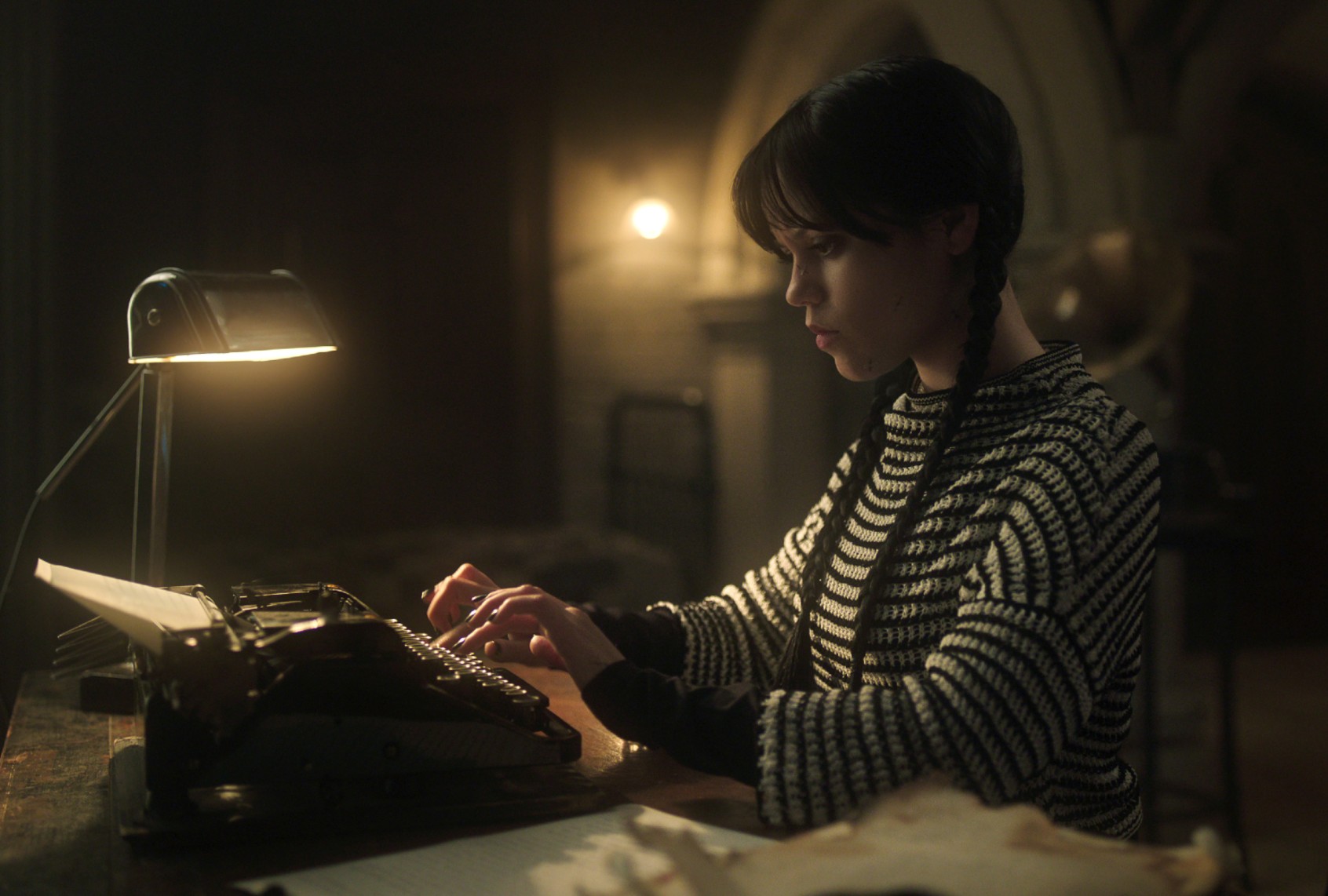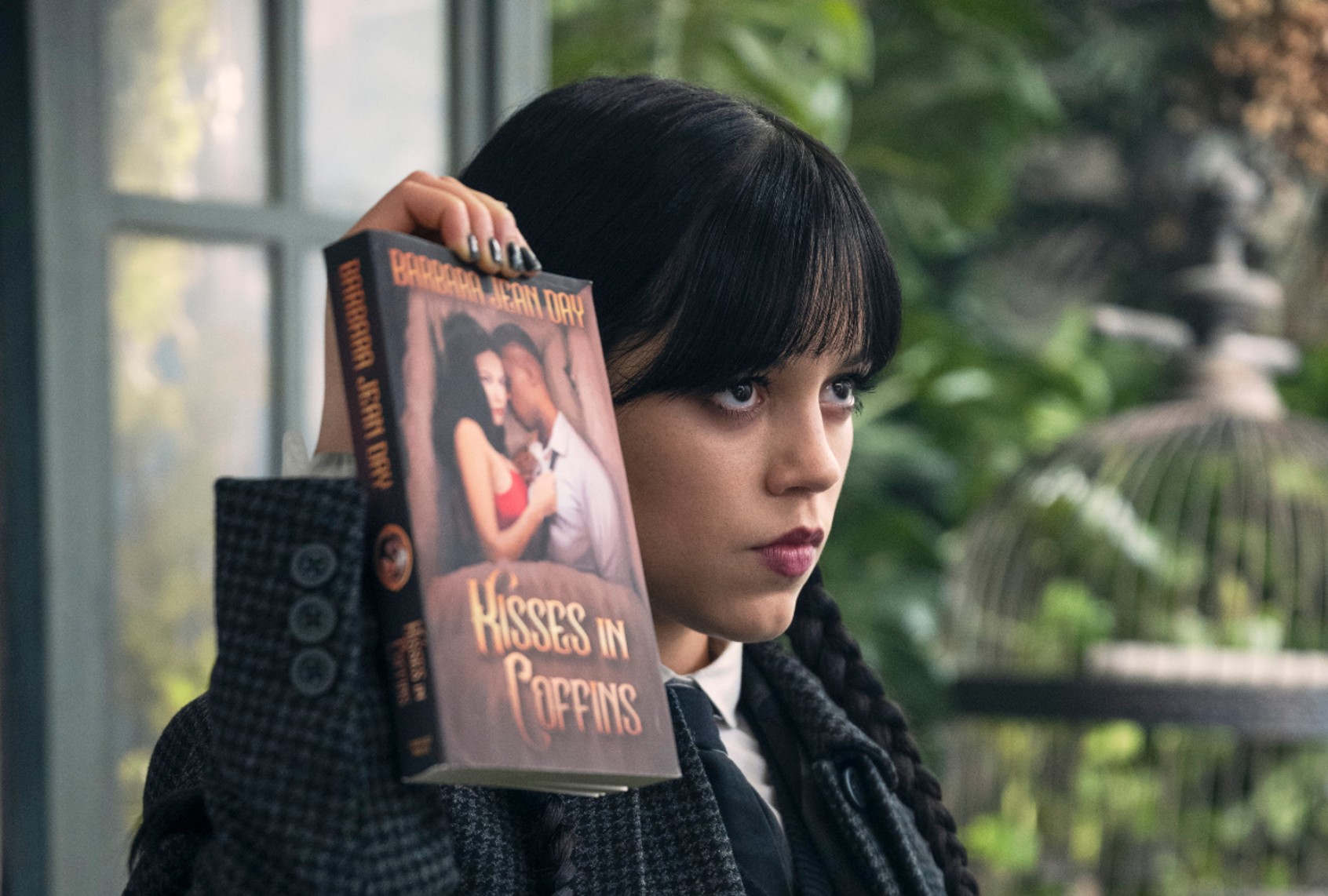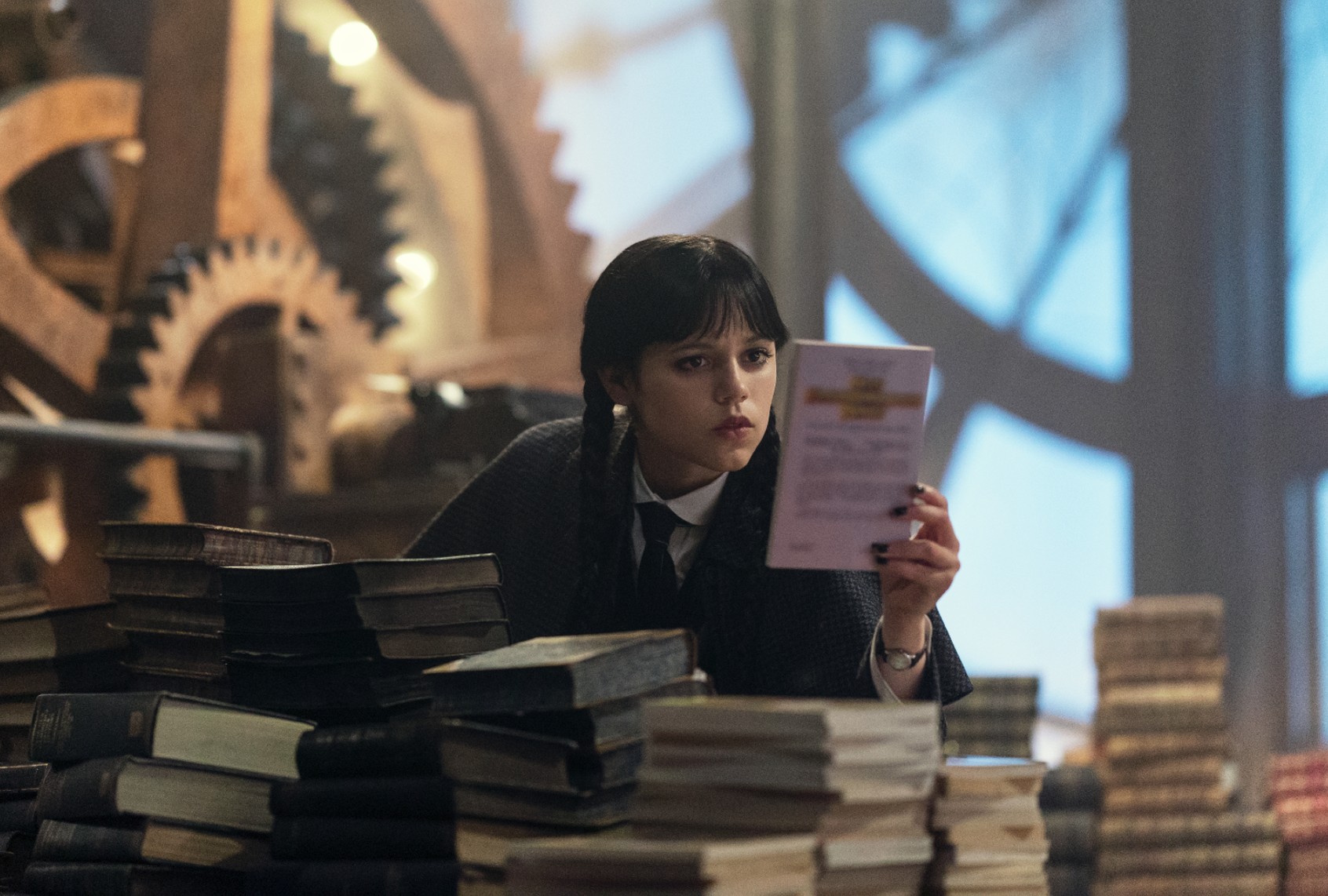The finale of the second season of “Wednesday” kicks off with a quote from William Faulkner, recited in a voiceover from the show’s namesake malcontent, played by a pitch-perfect Jenna Ortega, as she steadies herself on the brink of a dangerous mission in much the same way any good writer would: Literary dramatics.
“The past is never dead. It’s not even past,” we hear Wednesday say, pulling inspiration from Faulkner’s 1951 novel, “Requiem for a Nun,” prior to risking her own life to rescue her brother Pugsley (Isaac Ordonez) after he was kidnapped by a family of mad scientist monsters.
Wednesday can also be lauded as a perfect representative for writers and the writer’s way of life: Avoiding people, refusing edits, and carving out time for activities only if they involve dangerous sidequests that can later be turned into content and/or swordfighting one’s own mother in the woods late at night.
The character Wednesday Addams — a creation of American cartoonist Charles Addams — originated (albeit unnamed) in a series of New Yorker cartoons beginning in 1938, a faction of the cartoonist’s flipside of the American family ideal. From there, the character fleshed out in form and attitude in the 1964 “Addams Family” television series — created by David Levy in collaboration with Addams — and was later featured in the 1991 and 1993 films “The Addams Family” and “Addams Family Values” — My favorite, for Debbie Jelinsky reasons — where her character was played by Christina Ricci, who appears in “Wednesday” as a different kind of weirdo this time around, Marilyn Thornhill, a science teacher at Nevermore Academy who, of course, has ghastly ulterior motives.
Often thought of as the patron saint of goth girls or, really, dark-minded outcasts across the board, and more or less championed as the queen of them in Netflix’s adaptation, Wednesday can also be lauded as a perfect representative for writers and the writer’s way of life: Avoiding people, refusing edits, and carving out time for activities only if they involve dangerous sidequests that can later be turned into content and/or swordfighting one’s own mother in the woods late at night.

(Netflix) Jenna Ortega as Wednesday Addams in “Wednesday”
When we meet back up with Wednesday in Season 2, she’s still hard at work on her novel, “Viper de la Muerte,” a hefty tome about a teenage detective which is primarily, or at least heavily, an outlet for her to fictionalize her grievances towards her own family and friends, whom she would likely rather be referred to as obstacles, although she does love them all, as much as an Addams is capable.
A cartoon version of Jenny Schecter come to life, what transpires in her novel is close, if not on the nose, to what takes place around her, buffered by changed names and literary exaggerations. In this season’s penultimate episode, Wednesday walks in on her Grandmama, Hester Frump, played by Joanna Lumley of “Absolutely Fabulous” fame — directed by Tim Burton to tone down her accent so it’s “not too British” — who seems tickled by her work, two years in the making, especially her character Viper’s description of her mother as “a clingy stay-at-home optimist that makes Viper want to shed her skin more times than a cobra.”
The stay-at-home mom in question, Morticia (Catherine Zeta-Jones), passed down the writing bug to her daughter, we come to find, but she never received that type of positive feedback from Hester, resulting in her keeping her work a secret, until Wednesday snoops it out of her.
Confronted by Wednesday with the hardback version of a book she wrote under the pen name Barbara Jean Day (Easter Egg: Barbara Jean Day is the name of Charles Addams’ first wife and often rumored to be the inspiration for his Morticia character, though they met years after the character was created) Morticia explains why she kept her writing a secret, even though she’s loved doing it ever since she was Wednesday’s age.
“The sound of her humiliating cackle still haunts me,” Morticia tells her daughter, recounting the experience of her own mom, Hester, reading one of her earlier manuscripts and shaming her for it.
Holding her mom’s book in front of her, titled “Kisses in Coffins,” Wednesday digs into her mother’s wounds, saying she read the first few pages and it made her want to “vomit profusely.”
Start your day with essential news from Salon.
Sign up for our free morning newsletter, Crash Course.
“Perhaps one day you’ll appreciate the intoxicating power of weaving mystery and passion,” Morticia says in response, refusing to be dissuaded in her love of writing morbid smut similar to the way her daughter refuses to be dissuaded by her would-be publisher’s myriad of edit notes and advice to “seek help.”
“They’ll have to pry it out of my cold, dead hands before I change a single word,” Wednesday says of her writing at the start of Season 2, and then, later in the season, “I’d rather no one read my novel than make a compromise.”

(Helen Sloan/Netflix) Jenna Ortega as Wednesday Addams in “Wednesday”
Wednesday’s obsession with her writing and her continued futzing with her novel isn’t a minor detail that’s dropped in for character color and then forgotten. Wednesday’s love of writing and of books in general is woven all through Season 2. At the start of the season, she risks her life one of many times to retrieve her manuscript from a bonfire, placed there by an unknown stalker. When she later suffers “psychic exhaustion” and can no longer see the visions she uses to solve crimes, she turns to her ancestor Goody Addams’ Codex Umbrarum, a book of spells, cantations and lore, like a writer turning to a well worn copy of Sylvia Plath’s “The Bell Jar” or the complete poems of Emily Dickinson, as though simply touching the pages will give a jolt of inspiration and guidance.
Wednesday’s obsession with her writing and her continued futzing with her novel isn’t a minor detail that’s dropped in for character color and then forgotten.
“Can you be a little less Wednesday? This is supposed to be our best year ever,” her friend and Nevermore Academy roommate Enid Sinclair (Emma Myers) chides at one point, frustrated with Wednesday’s gloomy obsessions. But, no, she can’t. It’s already been well established that the Addams family doesn’t bend to “normie culture,” and that Wednesday’s writing is as important to her as solving mysteries or breaking in her arsenal of weapons in the process — or on her brother.
“I don’t evolve, I cocoon,” Wednesday says of herself at one point.
“To be haunted is a choice,” she says in a later scene, typing away at her book.
An Addams first. An outcast . . . definitely. But these are the sentiments of a writer, without question.
Placing herself in harm’s way numerous times throughout Season 2, Wednesday even lands herself in a coma at one point, and while she’s out, Morticia sits at her bedside and reads from Macbeth. Subconsciously hearing the words of Shakespeare, Wednesday’s mind travels to a spooky dream state where she converses with a spirit guide and is then told to “wake up,” which she does. As a writer myself, I don’t know if Shakespeare could rouse me from a coma — maybe, I don’t know, Anne Rice could do the trick for me there. But somehow, maybe even more than all of the above, this scene cemented Wednesday Addams in my mind as a hero not just for weirdos, but for writers, because what’s more deliciously dramatic than being at death’s door? Fighting your way back to life so you can finish your damn book and, when there’s time, help keep your friends and family safe and *shudder* happy.
Read more
about “Wednesday” and the world of Tim Burton


